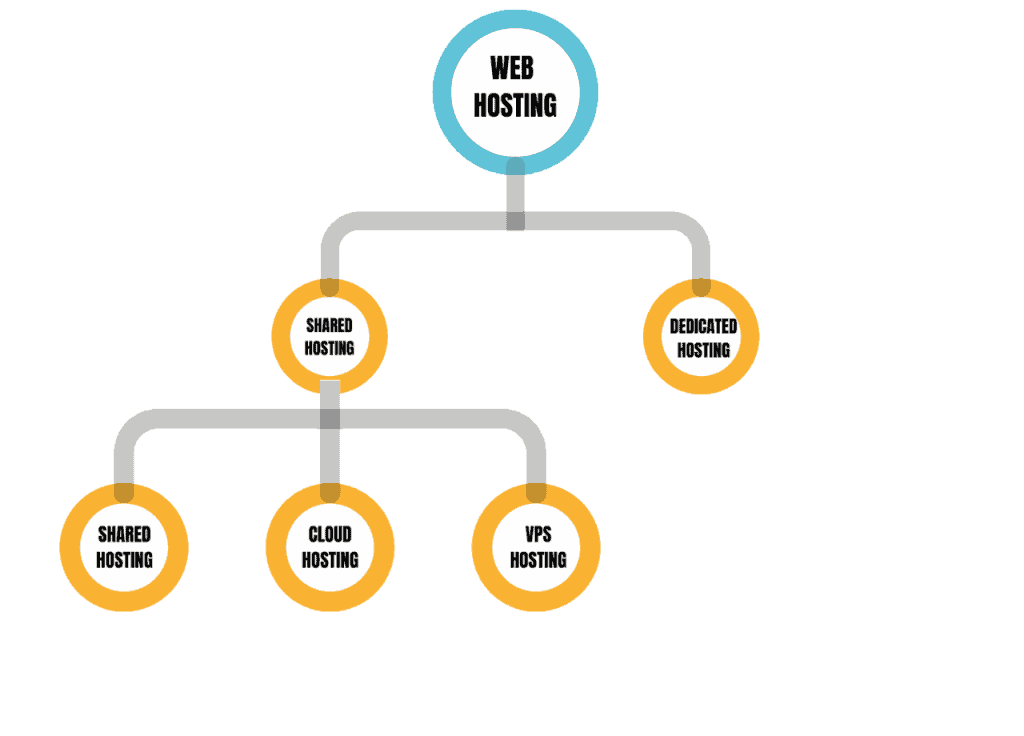If you shop around for a web hosting plan for the first time, you might be utterly confused by the endless options of different web hosting types.
Choosing the right web hosting for your business is a difficult task. We took that pain and compiled the list of different types of web hosting in this article.
Web hosting plans are not all about money. Because every project is different, and the requirements are also different.
Choosing the right web hosting is about analyzing your requirements and choosing a web hosting that aligns with that requirement for survival and scalability.
It’s all about choosing the right amount of resources that your website needs. Anything else beyond that is a waste.
Now, let’s get into this article and find out the different types of web hosting available on the market.
Table of Contents
What Is Web Hosting?
Every website you visit on a web browser lives on a server. A server is like a remote computer, similar to what we are used to.
The server stores all your website pages. When you access something on a web browser, those pages are fetched from the server.
When you buy a web hosting plan, you are renting a portion of resources of that server space ( Sometimes the whole server).
You can use that space and resources to build your websites. You need to pay monthly or yearly rent for that server space that you have occupied.
On paper, Web Hosting seems to be an easy concept like our personal computer. But in reality, it is much different. It requires a different set of software and hardware to convert a personal computer to a remote server.
When you are in the market for a web hosting plan, you should choose the one that matches your requirements. You can always upgrade to a better plan when you see a spike in traffic.
Different Types Of Web Hosting

Broadly, web hosting is categorized into two types.
- Shared Hosting
- Dedicated Server Hosting
Shared hosting is further classified into the following three types.
- Standard shared Hosting
- Cloud Hosting
- Virtual Private Server (VPS) Hosting
Standard Shared Hosting
Shared hosting is a preferred choice of many website owners. In shared hosting, a single server is shared across multiple users. Shared hosting hosts multiple websites, sometimes the number is in the thousands.
Shared hosting plans are very cheap as the server cost is diluted across multiple users. If a server accommodates fewer users, the price increases for all users.
Please note that you don’t get any dedicated resources in shared hosting. All resources are shared across all users of that particular server.
At any given time, if fewer users are accessing the server, you will get access to a good amount of resources.
However, on the flip side, you will lose access to additional resources when all users start using the server.
In shared hosting, each user hosts their website files in their space. Other users can not access those files, nor they can edit them.
There are instances when some users could break into other users’ files, but you can consider those instances as outliers.
Shared hosting has a bad reputation for speed. The reason is obvious. When multiple users use a computer, it will be slow only. Right? The same concept applies to web servers.
However, some web hosts offer a good amount of resources and speed, even when shared hosting. You need to analyze their web hosting plans before making a decision.

One of the main issues with shared hosting is the security of your websites. Indeed, other users don’t get access to your files.
But malware or viruses do not act that way. Often, mistakes by a single user can put all users of that server into trouble.
Shared hosting has its share of issues, but it is still the preferred choice as it is cheap, often offers unlimited storage and bandwidth, and, most importantly, is easy to set up.
You can get shared hosting plans for as low as $1 per month since the web hosting market is very competitive.
However, before buying, please look for the renewal rate, as most web hosts charge a bomb during renewals.
Please note that most web hosts offer the best deal when you sign up for a multi-year contract with no option for scalability in between.
This option is not bad if you can forecast your traffic stats. However, if you are unsure how things may turn around in the future, it is better to sign up for yearly plans only.
When Should You Choose Shared Hosting?
- If you are a beginner with a tight budget
- If you want web hosting for any of your hobby project
- You are trying to learn how things work in web hosting
Positive
- You will get shared hosting plans for as cheap as $1 per month
- Usually comes with unlimited space and bandwidth
- Setting up websites in shared hosting is very easy
- Absolutely no coding skills are required
- Tutorials are easily available on the internet
Negatives
- Shared hosting does not perform well for websites with heavy traffic
- The server response time is poor
- Your website may load slowly if it is hosted on a shared hosting
- Security is always a concern for shared hosting
Cloud Hosting
Cloud hosting is also a type of shared hosting, but the difference is that your website files are stored across multiple web servers instead of a single web server.
Since your files are stored across multiple servers like a cloud, it is called cloud hosting.
The main benefits of cloud hosting over traditional shared hosting are speed, low downtime, and scalability. Let me explain why it is so.

For example, your website files are stored across 10 different web servers in 10 different countries. Visitors from all those 10 countries will get equal speed as the server location is near them.
With shared hosting, you store your files on one web server in one country, and the whole world can access them from that country. So, for sure, the speed will be compromised.
Since, in cloud hosting, you are hosting your websites on a network of servers, there is always an option for scalability.
In case of a server failure, your website can be served from a different server. So, almost no downtime.
Cloud hosting plans are not cheap like shared hosting. However, depending on the server configuration, plans may cost as low as $5 per month to $100-$200 per month.
When Should You Choose Cloud Hosting?
- You want more speed and less downtime
- Your targeted audiences are spread across different countries
- Do you want scalability options
Positives
- Faster than standard shared hosting
- You can choose your server resources based on your need
- Files are stored on a network of servers
- Very less downtime
- You can scale your resources anytime you want
Negatives
- No dedicated server resources as cloud hosting is still a shared hosting
- Usually costlier than standard shared hosting
- Payment structure could be complex
Virtual Private Server Hosting (VPS)
As the name suggests, a virtual private server ( VPS) is a private but virtual server. A physical server is virtually partitioned, and each partition acts as an individual container.
Each partition acts as a full-fledged system where you can install your operating system, your web server, etc.
VPS offers a sort of isolation to each account, although they share the same physical server.
Please note that VPS is still a shared hosting, as all users share the same physical server. The only difference is that you get dedicated resources.

Just look at the above image and the image I have shown for shared hosting. In the above image, you can see four users on a single server, but each has its own space and resources.
So basically, they own a portion of a private server with dedicated resources, but all four users are still using a single server. That is why it is called a virtual private server.
Now, let’s talk about the resource allocation in virtual private servers.
For example, if a server has 10 GB of RAM and five users, each user will get 2 GB of dedicated RAM.
It’s up to you whether to use 2 GB of RAM or not, but the 2GB RAM will always be dedicated to you. In the case of shared hosting, if you don’t use any resource, it will be allocated to someone else.
The main benefit of a virtual private server is increased security and speed. Since you get dedicated resources, you have full control over how to use and optimize them.
No one else uses your space, so you will get better speed than standard shared and cloud hosting.
In most cases, VPS does not come with a control panel. You must use a command line interface to perform your day-to-day hosting activities. So, a fair amount of coding knowledge is required if you plan to use VPS.
The pricing starts from as low as $5 and goes up to a couple hundred dollars per month based on your chosen server configuration.
When Should You Choose Virtual Private Server (VPS) Hosting?
- Your blog or website has grown, and you are getting a good amount of traffic.
- Speed is important for your website.
- Security is a prime concern for you.
- You want full control of your server
- Do you want more customization on the server
Positive
- You will get dedicated resources
- Better speed than shared hosting
- You can customize the hosting environment the way you want.
- Better account isolation
- You will have full control of the server
Negatives
- A bit of coding knowledge is required
- Need to maintain your own space
- Tough to troubleshoot issues
- Way too costly than shared hosting
Dedicated Server Hosting
Till now, whatever hosting type we have discussed shares the server resources among different users. But in Dedicated server hosting, it’s an altogether different story.
Here, you rent the whole server ( Sometimes a couple of servers), and no one else is allowed to share it. It’s all yours.
You can use it and customize it the way you want. You control each and everything. You can choose your RAM, SSD space, Operating system, and anything. You can configure the server the way you want to match your requirements.

Dedicated server hosting is the top-of-the-line hosting type, which is why it is costly. Unless you are getting a huge amount of traffic or running an eCommerce store, there is no point in opting for dedicated server hosting.
When Should You Choose Dedicated Server Hosting?
- Getting an enormous amount of traffic
- Running an eCommerce store
Positives
- You own a private server
- Comes with dedicated resources
- You have full control of the server
- Best speed
- Much safer than shared hosting
- You can configure the server the way you want
Negatives
- Very expensive option
- Coding knowledge is required
- You should do server maintenance unless you opt for managed hosting
- Return on investment is a big hit or miss
What is WordPress Hosting?
Before learning about WordPress hosting, we need to understand why web hosts offer WordPress-specific hosting.
WordPress is one of the most popular content management systems that powers over 60% of websites. So, web hosting companies will obviously offer WordPress-specific hosting to gain market share.
WordPress hosting is a sort of managed hosting where the hosting environment is optimized for WordPress.
Sometimes, you may get free WordPress-specific premium plugins and themes if you choose WordPress hosting.
In most cases, the support team of the web hosting company manages all the maintenance activity so that users do not temper the pre-configured hosting environment.
WordPress may come preinstalled, and there may be some dedicated support for WordPress-related issues. The hosting environment is optimized for WordPress so that you get the best out of it.
Please note that you don’t need WordPress hosting to host a website that is built on WordPress. WordPress hosting makes your life easier by optimizing and configuring it to suit WordPress requirements.
Please don’t get fooled if some companies charge you more just because WordPress hosting is still a type of shared hosting.
Better to ask what extra they are offering in the WordPress hosting. If that makes sense, then only go for WordPress hosting.
What Is WooCommerce Hosting?
Like WordPress hosting, Woocommerce hosting is also a shared hosting optimized for WooCommerce.
Your hosting environment will be optimized for speed, security, and other aspects of a Woocommerce store.
What Is Managed Hosting?
Many of us, including me, know little about how a web hosting process works. We don’t know how to get the best out of a web hosting service. The result is, ” We start blaming our web host.”
That’s not fair at all. To overcome these kinds of issues, most web hosts nowadays offer a Managed Hosting service.

What that means is that every one of your web hosting services will be maintained by experts from the web hosting company itself.
Some tasks include server maintenance, software updates, security patches, backups, etc.
The support team will decide how the server should be optimized, they will decide the key variables and the best settings that your hosting environment should have.
In a nutshell, they will give you the best possible setup for optimum performance. So basically, managed hosting is a kind of service rather than a different type of web hosting. You won’t get anything extra other than expert service in Managed Hosting.
But the expert service also makes sense. Right? They always go one step extra and optimize your hosting environment to suit WordPress’s requirements. As a result, you get the best speed and experience from your WordPress blog.
Managed Hosting can come in any flavor since it’s a service. Even shared hosting can be managed if you pay a little extra for the managed service. The same applies to other types of hosting, too.
What Is Reseller Hosting?
If you run a web development agency with many clients, there is a chance that they will ask you to suggest or set up web hosting for themselves.
In most cases, they don’t know how to set up a website or the technicalities of web hosting.
It is extra work, but you are probably charging for it. It would be a one-time income for you. How about a recurring income source from the same service that you are offering?
You can buy a Reseller Hosting plan and start offering hosting services to your clients. In reseller hosting, you will be given the option of how many sub-accounts you can sell.
You can sell sub-accounts and earn a decent recurring income. Clients pay you directly, and you can keep 100% of that payment.
Interestingly, the main hosting company from where you bought the reseller hosting package does not care how much you charge your clients for the sub-accounts.
Often, reseller hosting comes with a white-label option. This means your client won’t see the main hosting company branding; instead, they will see your agency branding.
Reseller Hosting is a great option if you want to start your hosting business but do not have the infrastructure and resources a mainstream web hosting company needs.
You can start with reseller hosting and upgrade to mainstream hosting when you make much money from your reseller hosting business.
Conclusion: Types Of Hosting
I believe now you have an idea about different types of web hosting, and you might be in a position to choose which type of web hosting is the best for your business.
Recommending a specific hosting type without knowing your requirements is difficult because every project has a different requirement.
However, if you are just getting into web hosting, starting with Shared Hosting is better as the learning curve is linear.
Once you get some experience, you will better realize which type of hosting is best for your business and accordingly decide.
We need to consider that until and unless you are sure about your projected growth, don’t sign up for multi-year contracts.
If you do so, you may be stuck with that hosting company for a couple of years without any scope of scalability.
It’s a wise decision to pay a little extra for month-to-month plans until you are sure about your business growth projections.
The positive of the monthly plan is that you can switch your hosting company anytime and choose a better hosting that complements your website’s traffic spike.
To simplify your life, we have compiled a list of 10 Best Web Hosting, which might be useful if you are unsure which web host to choose.
I suggest starting with Cloud Hosting like Cloudways and slowly moving to VPS hosting if you see a spike in traffic.
FAQ | Types Of Web Hosting
What Is a Web Hosting Service?
A web hosting service is a type of Internet service that hosts websites for clients, i.e., it offers the facilities required for them to create and maintain a site and makes it accessible on the World Wide Web.
Web hosting service is also a protocol through which a web browser communicates with a web server and fetches the content that the browser requests.
How Much Does A Web Hosting Cost?
A web hosting plan can cost as low as $1 or as high as a couple of thousand dollars, depending upon which type of web hosting you have chosen and what the server configurations are.
What Are The Different Types Of Web Hosting?
The list below shows the types of web hosting that most web hosts offer.
Shared Hosting
Cloud Hosting
VPS Hosting
Dedicated Server Hosting
WordPress Hosting
WooCommerce Hosting
Managed Hosting
Reseller Hosting